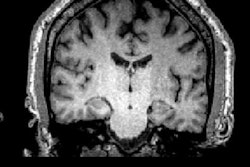Based on a brain autopsy using PET with the radiopharmaceutical FDDNP, researchers believe they have confirmed a diagnosis of chronic traumatic encephalopathy (CTE) in a former NFL player, according to a paper published online November 10 in Neurosurgery.
The FDDNP-PET scan was performed 52 months before the death of Fred McNeill, who played 12 seasons in the NFL and died in 2015. The scan targeted the cortical and subcortical regions of the brain; the brain was examined again after death to determine any neurodegenerative changes.
The researchers, led by Dr. Bennet Omalu from the University of California, Davis, discovered that the binding by FDDNP correlated with the presence of tau deposits, which are associated with dementia, Alzheimer's disease, and other neurologic abnormalities. The greatest distribution was seen in the parasagittal and paraventricular regions and in the brain stem.
The findings are particularly relevant given previous research on the association between CTE and repeated head trauma experienced by athletes who play contact sports. According to a November 16 report by CNN, FDDNP-PET has shown promise for evaluating former athletes who exhibit cognitive problems associated with concussions.
An April 2015 study from researchers at the University of California, Los Angeles found a pattern of abnormal tau protein deposits that was similar to CTE but differed from what is seen in healthy people and individuals with Alzheimer's disease.
Additional research is needed to verify the findings and to assess FDDNP-PET's efficacy in diagnosing people who may be at risk for CTE, the group noted.




















